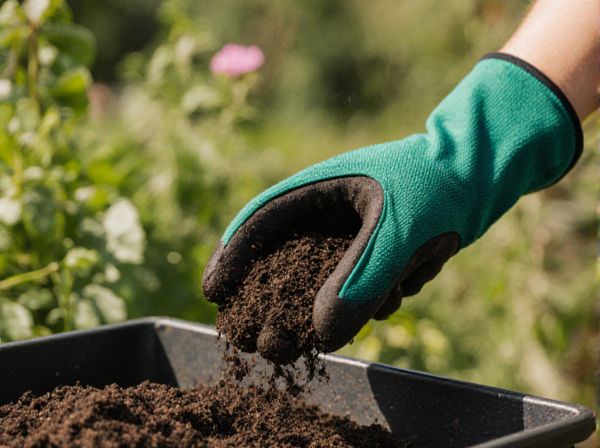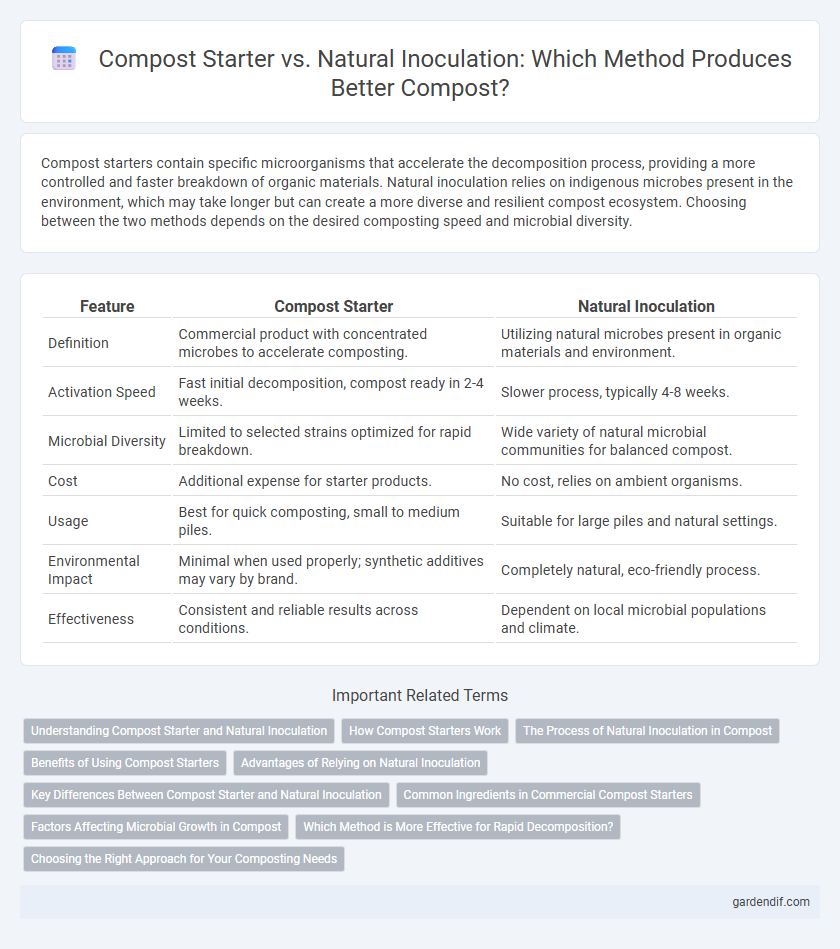
Compost Starter vs Natural Inoculation Illustration
Compost starters contain specific microorganisms that accelerate the decomposition process, providing a more controlled and faster breakdown of organic materials. Natural inoculation relies on indigenous microbes present in the environment, which may take longer but can create a more diverse and resilient compost ecosystem. Choosing between the two methods depends on the desired composting speed and microbial diversity.
Table of Comparison
| Feature | Compost Starter | Natural Inoculation |
|---|---|---|
| Definition | Commercial product with concentrated microbes to accelerate composting. | Utilizing natural microbes present in organic materials and environment. |
| Activation Speed | Fast initial decomposition, compost ready in 2-4 weeks. | Slower process, typically 4-8 weeks. |
| Microbial Diversity | Limited to selected strains optimized for rapid breakdown. | Wide variety of natural microbial communities for balanced compost. |
| Cost | Additional expense for starter products. | No cost, relies on ambient organisms. |
| Usage | Best for quick composting, small to medium piles. | Suitable for large piles and natural settings. |
| Environmental Impact | Minimal when used properly; synthetic additives may vary by brand. | Completely natural, eco-friendly process. |
| Effectiveness | Consistent and reliable results across conditions. | Dependent on local microbial populations and climate. |
Understanding Compost Starter and Natural Inoculation
Compost starter contains concentrated microorganisms and enzymes that accelerate the decomposition process when added to organic waste, providing a controlled boost for faster composting. Natural inoculation relies on existing microbes in the environment, such as those from soil, air, and organic materials, to gradually initiate breakdown without external additives. Understanding these methods helps in selecting the appropriate approach based on composting goals, speed requirements, and resource availability.
How Compost Starters Work
Compost starters work by accelerating the decomposition process through the introduction of concentrated microorganisms, enzymes, and nutrients that break down organic matter more efficiently than natural inoculation alone. These starters create optimal conditions for microbial activity, ensuring faster heat generation and pathogen reduction in the compost pile. Using compost starters typically results in quicker production of nutrient-rich humus compared to relying solely on naturally occurring microbes in the environment.
The Process of Natural Inoculation in Compost
Natural inoculation in compost relies on indigenous microorganisms present in organic materials and surrounding soil to initiate decomposition. This process involves the gradual colonization of compost piles by bacteria, fungi, and actinomycetes, which break down complex organic matter into humus without the need for added starters. Moisture, aeration, and temperature regulation are critical factors that enhance microbial activity and ensure efficient natural inoculation throughout composting.
Benefits of Using Compost Starters
Compost starters accelerate the decomposition process by introducing beneficial microorganisms that optimize organic matter breakdown, resulting in faster nutrient-rich compost production. These starters enhance microbial activity, improve temperature control, and reduce pathogens, creating a more efficient and reliable composting environment. Using compost starters ensures a consistent supply of healthy soil amendment, supporting plant growth and reducing waste effectively.
Advantages of Relying on Natural Inoculation
Relying on natural inoculation for composting promotes a diverse microbial ecosystem that enhances nutrient cycling and soil health more effectively than compost starters. This method leverages existing microorganisms from the environment, reducing costs and dependence on commercial products while fostering sustainable, organic processes. Natural inoculation also adapts to local conditions, improving compost quality and resilience against pathogens.
Key Differences Between Compost Starter and Natural Inoculation
Compost starters contain concentrated microorganisms and enzymes designed to accelerate decomposition, while natural inoculation relies on the existing microbial community present in organic materials and soil. Starters often include specific bacteria and fungi strains that enhance nutrient cycling efficiency, whereas natural inoculation depends on the ambient environment's microbial diversity, which can vary in activity and effectiveness. The use of compost starters typically results in faster composting times and more predictable outcomes compared to the slower, less controlled process of natural inoculation.
Common Ingredients in Commercial Compost Starters
Common ingredients in commercial compost starters include nitrogen-rich materials like soybean meal, blood meal, and alfalfa meal that accelerate microbial activity. Enzymes such as cellulase and ligninase are often added to break down tough plant fibers faster. Beneficial microbial cultures, including Bacillus subtilis and Trichoderma species, enhance decomposition by boosting the population of active microorganisms in the compost pile.
Factors Affecting Microbial Growth in Compost
Microbial growth in compost depends heavily on factors such as temperature, moisture content, and oxygen availability, which influence decomposition rates and nutrient cycling. Compost starters introduce concentrated microbial populations that can accelerate the composting process by optimizing microbial diversity and activity. Natural inoculation relies on indigenous microorganisms present in organic matter and the environment, which may result in slower microbial colonization but promotes ecosystem-specific microbial balance.
Which Method is More Effective for Rapid Decomposition?
Compost starters contain concentrated microbes and nutrients that accelerate organic matter breakdown, resulting in faster decomposition compared to natural inoculation, which relies on ambient microbial populations. Studies show compost starters can reduce composting time by 25-50%, making them ideal for rapid nutrient cycling. However, natural inoculation is more cost-effective and promotes microbial diversity, suitable for long-term soil health buildup.
Choosing the Right Approach for Your Composting Needs
Choosing between compost starter and natural inoculation depends on your composting goals and timeline; compost starters contain concentrated microbial cultures that accelerate decomposition, ideal for rapid results. Natural inoculation relies on indigenous microorganisms present in organic waste and surrounding environment, promoting a slower but sustainable composting process. Assessing factors like compost temperature, material diversity, and desired turnaround can help determine the optimal method for efficient nutrient cycling and soil enrichment.
Compost Starter vs Natural Inoculation Infographic

 gardendif.com
gardendif.com